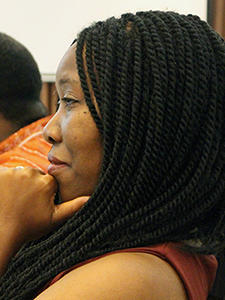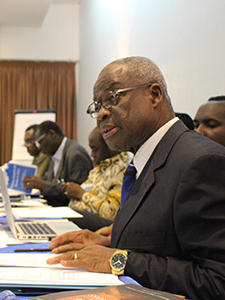Divinity School scholars studying religious freedom and society in Africa
In February of 2011, religious leaders from across Africa met in Accra, Ghana, to discuss their dual roles as people of faith and members of civil society. They sought to reconcile their beliefs with their obligations as citizens of countries torn apart by war, religious extremism, and dictatorial regimes.

The conference built on previous workshops in Dakar, Accra, Addis Ababa, and Nairobi, and concluded with the Accra Charter of Religious Freedom and Citizenship. “Our dual citizenship,” the statement said, “recognizes the complementarity of our roles as believers and citizens in which freedom becomes the ground of connection between the two.”
Yale Divinity School scholars are exploring those dual roles through the Project on Religious Freedom & Society in Africa, part of the World Christianity Initiative (WCI) at Yale. The scholars have launched an interdisciplinary study of the impact of religious resurgence on democratization and social empowerment. The Project on Religious Freedom & Society in Africa is housed at the Whitney and Betty MacMillan Center for International and Area Studies at Yale.
According to the project’s website, the duties of religion and nationality overlap, making “obedience to God an obligation simultaneous with loyalty to the nation.”
“Religion has a big role to play at the level of civil society,” said Lamin Sanneh, the director of the religious freedom project, the D. Willis James Professor of Mission and World Christianity, and professor of history and of international and area studies.
“Economic and political pressures have fueled an upsurge of religious interest, creating new fault lines, along with new opportunities for research and outreach,” said Sanneh. “Amid current economic challenges and rising expectations driven by demographic and labor shifts, religious resurgence is evidence of the search for new meaning and forms of community across the world.”
 Underlying the research is the premise that faith communities outside the West face unique challenges and opportunities. As new nations emerge, so do new communities of faith as well as new ways of looking at religion and citizenship. The Religious Freedom and Society in Africa Project sees overlapping duties, said Sanneh. Christian teaching has addressed these dual obligations from a Western point of view, but not from that of emerging post-Western societies, he notes.
Underlying the research is the premise that faith communities outside the West face unique challenges and opportunities. As new nations emerge, so do new communities of faith as well as new ways of looking at religion and citizenship. The Religious Freedom and Society in Africa Project sees overlapping duties, said Sanneh. Christian teaching has addressed these dual obligations from a Western point of view, but not from that of emerging post-Western societies, he notes.
The project will conduct fieldwork in three areas: research into contemporary religious issues and their implications for society and democratic politics; regional workshops on the themes of the Accra Charter; and lectures on religious freedom and civil society.
Author of several books on religion in Africa, Sanneh has studied the interplay between freedom movements and efforts to establish new societies and create strong civil institutions. “Creating structures of civil society under indigenous leadership is a necessary building block of democratic politics and social progress,” he said.

Sanneh sees the themes of the Accra Charter as a framework for engaging partners in research throughout Africa. His research goals include finding effective methods for obtaining information on civil institutions; determining how much citizens participate in civil society; identifying community structures for guiding individual behavior and conduct; gauging the effects of political activity on understanding and membership in civil society; studying the role of voluntarism in African society; and assessing political and cultural factors that affect voluntarism.